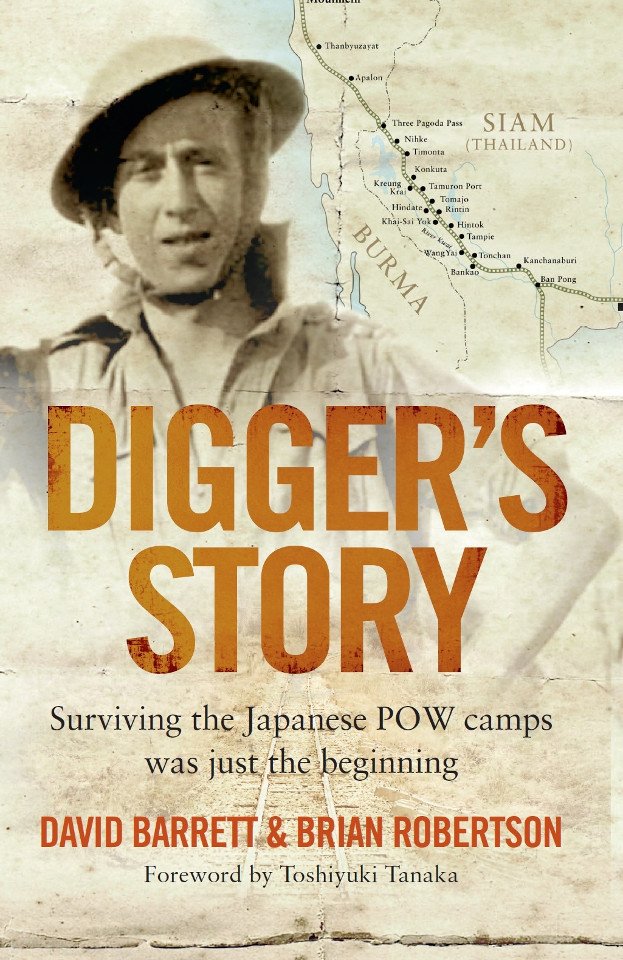How do you survive when you're beaten, starved and humiliated as a prisoner of war in a camp on the Thai-Burma railway? 'You stick together, that's what you do,' says David 'Digger' Barrett. 'You scam, lie, steal, cheat and hate the bastards with as much energy as you love and protect your mates.'
Digger was given his nickname at an early age by his father. It was prophetic: as an eighteen-year-old looking for fun and adventure, he enlisted as a private and served in World War II. After surviving the Malayan campaign, he would spend over three years as a Japanese prisoner of war.
It would take Digger more than fifty years to rid his mind of the hate he had for the guards of the Imperial Japanese Army. His story of courage, mateship and survival takes him from the prison camps of Thailand and Burma to the fight for reparations for all Australian POWs of the Japanese.
Honest and unflinching, and with the Aussie soldier's larrikin streak, Digger's Story is an unforgettable journey.
Authors: David Barrett and Brian Robertson
Digger's Story is generally available and is stocked by major high street and on-line book sellers in Australia.
Purchasers outside Australia can purchase the book via on-line book sellers and also directly from Five Mile Press at:
http://www.fivemile.com.au/books/new-titles/diggers-story.html
E-Book versions of Digger's Story are now available (at very reasonable cost of course). They can be found at the following places and probably elsewhere:
The book should also be available in some selected UK book stores.
A few copies of Digger's Story signed by the surviving author are available direct from the author for $34.00 including postage to anywhere in Australia.
About the Authors
David (Digger) Barrett
David (Digger) William Barrett was born in Wollongong NSW in February 1922 and promptly nicknamed Digger by his father. The family soon moved to Melbourne where David was schooled. He left school in 1936 and went to work at the Australian Glass Manufacturers in Melbourne. War was looming and in 1938 David joined the 16th Field Ambulance Second Cavalry Division, Light Horse Militia (part time) and by 1940 had joined the AIF at Melbourne Town Hall. He was allocated to the 2/9th Field Ambulance, 8th Division and went to Singapore on the Queen Mary spending a very pleasant year in Malaya before Japan invaded.
The allies surrendered to the Japanese on 15 February 1942 and David became a Prisoner of War (POW) in Changi where he remained until August 1943. He was transported to Kanchanaburi on the Siam/Burma railway as part of “L Force.” In April 1945 he was transported as medical orderly, for 200 other POWs, to Lopburi in Central Thailand and remained there until the Japanese surrender in August 1945. Soon after the surrender he volunteered for the allied War Graves Commission Survey to head back up the railway to locate all the allied grave sites. In early November 1945 he travelled back to Australia by ship and was discharged from the army in January 1946, returning to work at the Australian Glass Manufacturers in Melbourne.
Quickly tiring of the glass works, David made up his mind to get on with life, bought a house, met and married Betty, and went into the painting business with his brother in law. By 1948 he was still looking for more adventure and decided to sell up and move to Queensland where he got a salesman’s job, his true calling. He worked in hardware, paint manufacturing, public relations and finally as manager of Yaffa Publishing. He married his second wife, Greta, in 1980 and retired soon after.
In 1986 David founded the Queensland reparations committee later to become the Australian reparations committee to fight for reparations from the Japanese. In 1990 he travelled to Geneva and lodged the Australian Reparation Committee’s claim against the Japanese Government at the United Nations offices.
In August 1990 David resigned from the Australian Reparations Committee and went to live in Tasmania—but still kept fighting for reparations. From 1990 David visited and made friends with many Japanese most of whom helped him in his efforts to gain reparations. Reparations of $25 000 was eventually paid to all ex-POWs or their surviving widows by the Australian Government in 2001.
Sadly, David died on 22 July 2012.
Brian Robertson
Brian Robertson was born in Aberdeen, Scotland in 1936 but was raised and schooled in rural Aberdeenshire when his father bought a small farm at Rothienorman.
He left school as soon as possible to work on the farm.
Conscripted to the 1st Battalion Gordon Highlanders he served for two years mostly in Cyprus and then returned to farming.
Brian married Marjorie in 1959 and returned to schooling and education graduating from Aberdeen University in 1970.
He taught secondary school science in Scotland before taking the family to Papua New Guinea in 1978 where he worked in curriculum development.
The family immigrated to Australia when Brian joined the Northern Territory Department of Education in 1986.
He returned to the South Pacific, to the Solomon Islands, for four years as Australian team leader of an Australian aid project and eventually retired in 1998.
Since then Brian has written textbooks for South Pacific schools eventually daring, with David Barrett, to write David’s biography.
